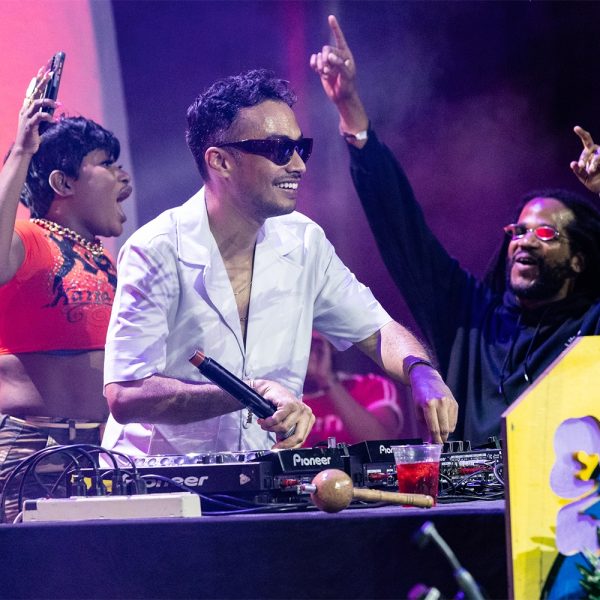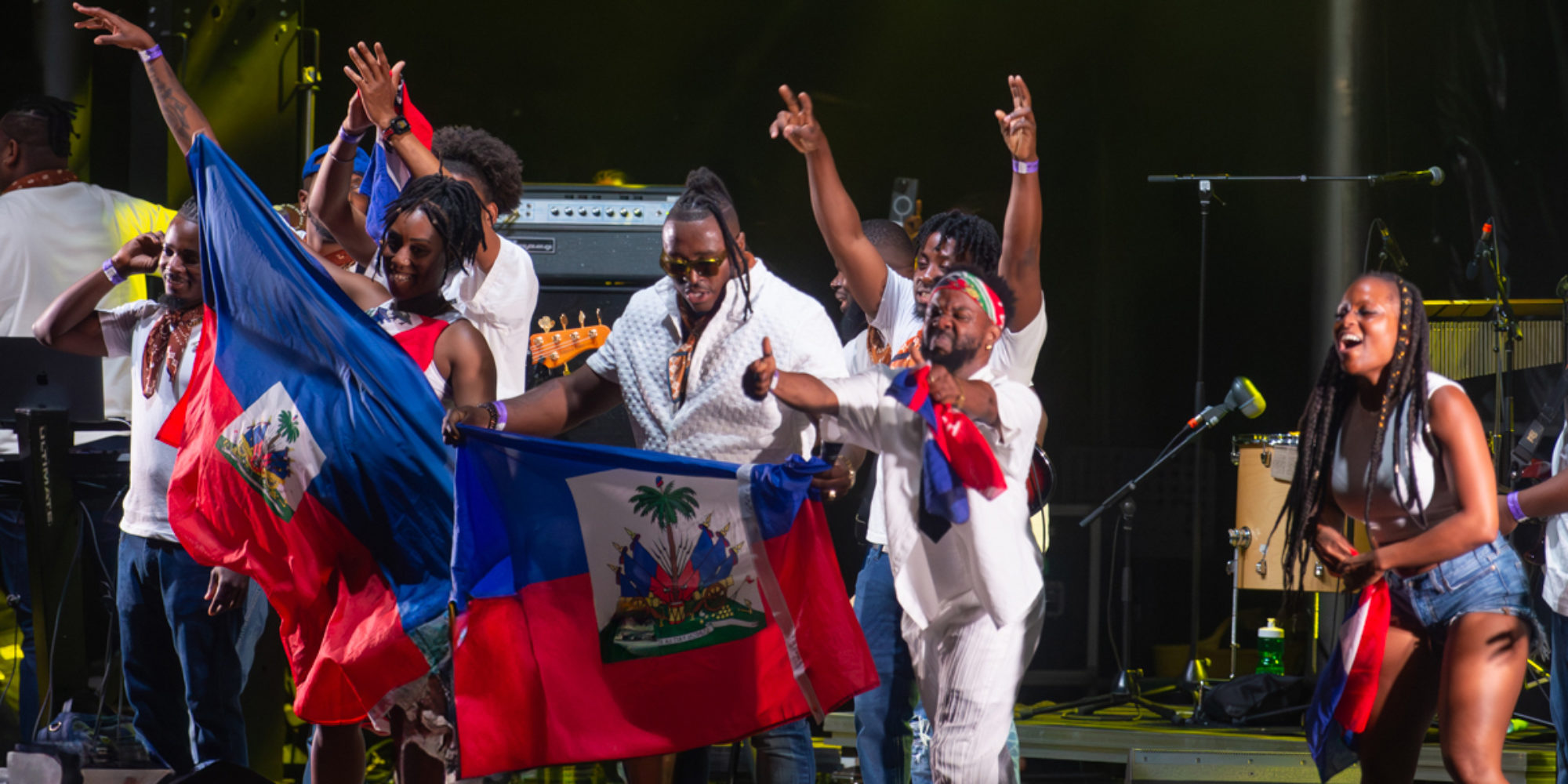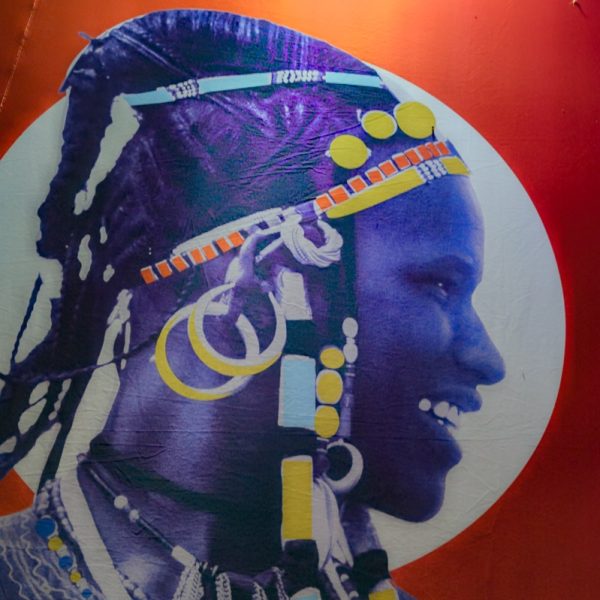Montreal has long been a refuge for Haitian exiles. Of all the African and Caribbean populations in this chilly Canadian city—and there are many—Haiti is the oldest and largest. So it’s no surprise that Haiti is always well represented at the summer Nuits D’Afrique Festival, one time when the city is anything but chilly! 2025 was no exception, and one Haitian act that got top billing this year was Baz Kompa. On the afternoon before their set on July 19, Banning Eyre sat down with J.S. and Polo Elie of the band for to get an introduction, and a word on the surging popularity of kompa music. Here’s their conversation.
Photos by Banning Eyre.
Banning Eyre: To start, just introduce yourselves.
J.S.: So my name is George. Usually they call me J.S.. I'm the manager of the band Baz Kompa, and we have a Polo Elie. Polo is the lead singer of the band.
Okay, Polo, tell us the story of the band, in English or French, as you like.
Polo Elie: The band has existed since 2018. I joined in 2021, so it's been four years. So the band was already there, but with my presence and there's been a new energy that complements it to make what we have today.
I have seen your videos on YouTube and that energy is certainly there. Tell me about the name of the group.
This band is like a brotherhood, okay? B means “good” in Creole. A means “in,” and Z means “friend.” It's like being among good friends. So that's what makes B, A, Z. So basically, we say it's a family, it's a brotherhood, we're all united. That's why we get along so well.
OK. What about Kompa? Tell us about Kompa music. Kompa was the first Haitian music I ever listened to, a long time ago. But in the American music scene, it was mostly the roots, or racine, groups: Bookman Eksperyans, Polo Beaubrun, Boukan Ginen, lots of groups like that. But when I saw Michael Brun’s recent Bayo show, it was almost all kompa. It seems like kompa is experiencing a renaissance. But I think we need to know a bit about the history of kompa.
J.S. Actually, Kompa is having its 70th anniversary. It's been 70 years since it began. In 1955, Nemours Jean-Baptiste was a saxophonist, and he formed a band with Weber Sicot in Haiti. Kompa music existed before, but not the name. There were local bands like Tropicana in Cuba. So we had bands like Septentrional d'Haiti, for like 80 years.
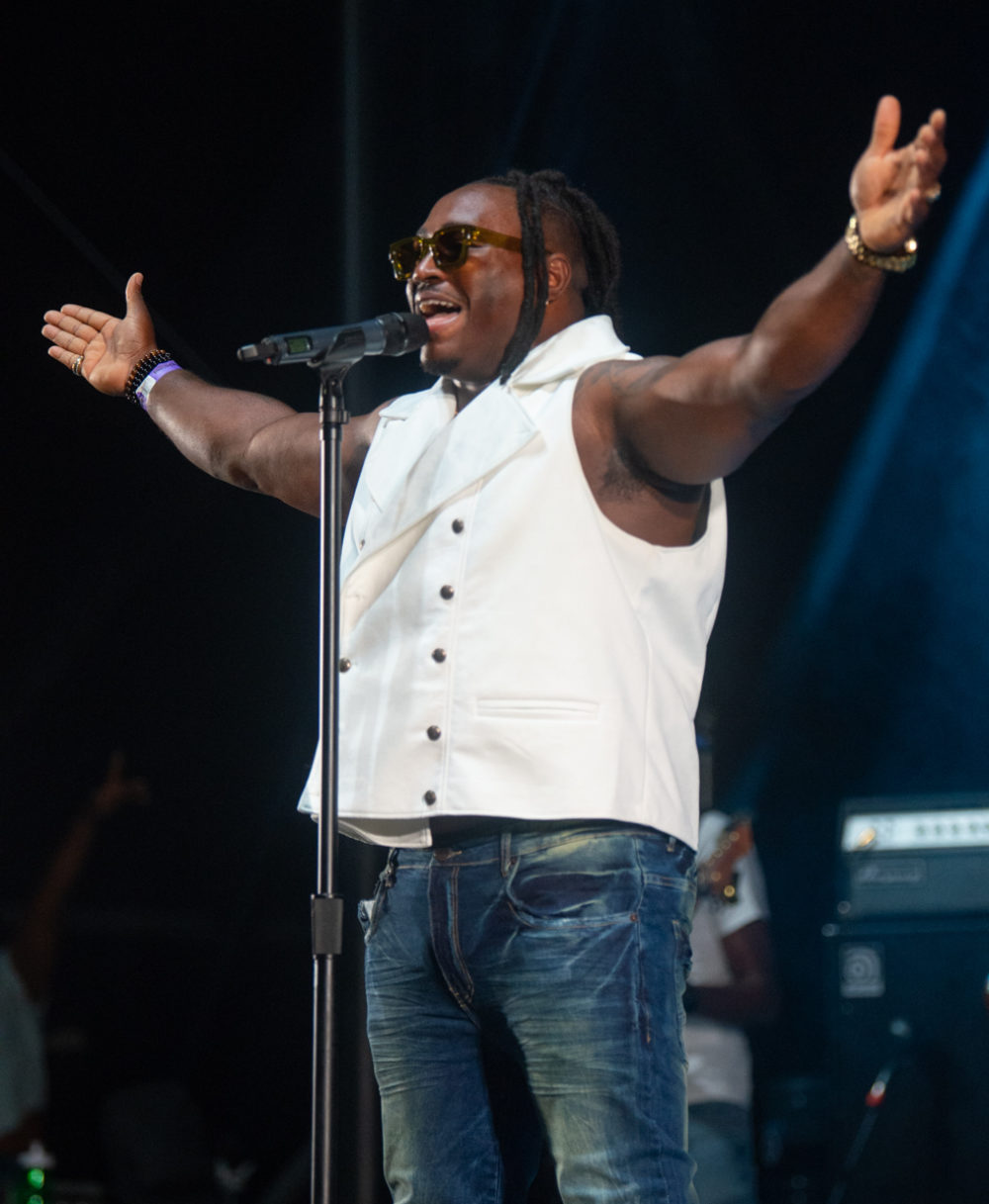
What about the word kompa?
That’s the thing. When Jean-Baptiste performed, he always said, “Kompa, kompa, kompa!” So it became like that. We called it Kompa direct. Then later, Haiti came up with new bands, like jazz bands, with synthesizers and keyboards. So they changed the sound; it became more commercial. So you had bands like Top Vice and Tabou Combo. They were superstars. So these bands changed kompa direct more. They put the modernity of a new generation, they gave new vibe to it. And you could say, these guys pushed kompa; they moved it closer to what we have now.
Tabu Combo was one of the biggest bands touring the world with kompa. Today, we can talk about artists like Jean de Fillet. More and more younger bands have embraced kompa. But Tabu Combo was one of the bands that started in Japan and became popular worldwide. And something we have to say about Kompa, we have a different styles of kompa. We have kompa direct, we have love kompa, we have raboday, we have pop-kompa.
Raboday?
Yes, raboday is like dancehall for Jamaicans. Raboday is the same thing for Haitians. Some DJs will play raboday, especially for Carnival. And then there’s traditional music, racine—people like Boukan Ginen and Boukman Eksperyans. We also have Vodou groups, like Ram. And we have regular kompa. Now you have the new wave kompa, the old kompa. So you have the whole division. So Baz Kompa is new age kompa, pop kompa. We’re like a boy band. But tonight at the show, you will see the old fashion kompa too, because we have a horn section. To have a full kompa direct, you must have a horn section, and the whole back line with backing singers and all this stuff. That’s when you say, “This is real kompa direct.”
Okay, that's very good. Polo, you are a composer as well? Tell us about the songs we’re going to hear tonight.
The songs we’ll play tonight are ones we always work on together. The Maestro, Jean Wesly Fils and I, we always work together. So once the ideas come, we take them to the best studio, and they go into the repertoire, and that's what you will hear tonight. There are tracks like "Rete Avem," "Sel Lanmou Kap Rete," and "Trop Tard." These are our own compositions. You will have the pleasure of hearing our inspirations tonight.
Can you talk about the messages in your songs? What do you sing about?
Kompa in general, our music in general, we deal with all sorts of subjects, but mostly real-life issues, what people experience in general. So right now we're preparing an EP, an album, and there will be a lot more socially conscious music, music that will address the situation in Haiti, that will address immigration. These are songs we’ve been working on in the studio. But tonight, we'll be focusing more on love, on many topics related to love. These are subjects that people experience every day in romantic relationships.
So, for example, we'll take a song like "Rete Avem." "Rete Avem" means you can't live without a woman. It's about a guy who can't live without this woman's presence. The woman travels, she goes to work elsewhere, and he's not well. So he says, "The gold isn't there; it's a sunburn, not the rose." He says, “When you're not there, it's like there's no sun, and a lack of oxygen. When you're not there, oxygen has resigned.” That's what it means. So lots of beautiful themes. People will definitely have something to enjoy tonight.
Are there albums of Baz Konpa?
We're working on an album, or an EP—it depends. So, we have some songs that are already online, on YouTube, like the one I just mentioned, "Rete Avem." "Trop tard" and "Slowly" are also there. People have plenty of songs they can listen to. These are compositions that many people will hear tonight.
How many musicians on stage tonight?
J.S.: It’s the whole band. I think we are 12 now, 12 musicians on stage, plus five dancers.
That's good for that big stage.
There’s the horn section—trumpet, saxophones... There are the two chorus singers and the lead singer, then bass, two guitars, drums, congas, and a keyboard.
You live in Montreal, and I understand that the Haitian community is the largest diaspora community here. After that comes Congo. Is that right?
I always heard there were 150,000 here. But now, I think it's more than that. A lot of people have come from the United States recently. Now it should be 200,000. So, we have a really big community here since a long time ago. I was born in 1986, during the time of Duvalier. A lot of people came here then, and they stayed. This exodus has been going on for 30, 40 years now. It's a large community that's still in the east of the city. And it's a community that comes together for gatherings. We have a lot of businesses from Haiti, a lot of supermarkets, beauty salons, beauty supplies, barbershops. And music. We have, let's say, 20 kompa bands here in Montreal.
Really?
There are six or eight performing constantly. But it's almost 20 bands here in Montreal. And when we do a party at night, you can have up to 4,000, 5,000 people. And when a festival takes place, you can have 10,000 people at the festival, even 18,000 people at the festival. And that's in Montreal. You also have Toronto, Ottawa, and some from Quebec City too. So it's a huge presence. And at all the businesses in town, you're going to hear music from Haiti. Kompa music is commercial now. It was a community music, but now it’s commercial. Sometimes, I go somewhere and I just hear kompa from Haiti.
At the BAYO event in New York, there were probably 10,000 people, and there were many, many artists that I didn’t know. But the audience knew them, they knew all the songs. It seems like, interestingly enough, this is a tough time for Haiti, but it's a good time for Haitian music, wouldn’t you say?
Yes, I think that's true. That's exactly what it looks like when you talk about Jean de Fillet. He put kompa music on another level. He showed up, he started a label…
He did something with Burnaboy, right?
With Burnaboy also. Africans and Haitians have connected since 1804. Now this connection is even stronger. Even this morning, I woke up and I heard music from Ozuna, the Puerto Rican singer. He was doing a kompa song. Even if it was in Spanish, it was a kompa song.
That's fantastic. Well, it must be nice to have something good happening, given all the problems in Haiti these days.
That's what we have left, culture: food, music, sport… Rum.
That’s not bad either. Barbancourt forever!
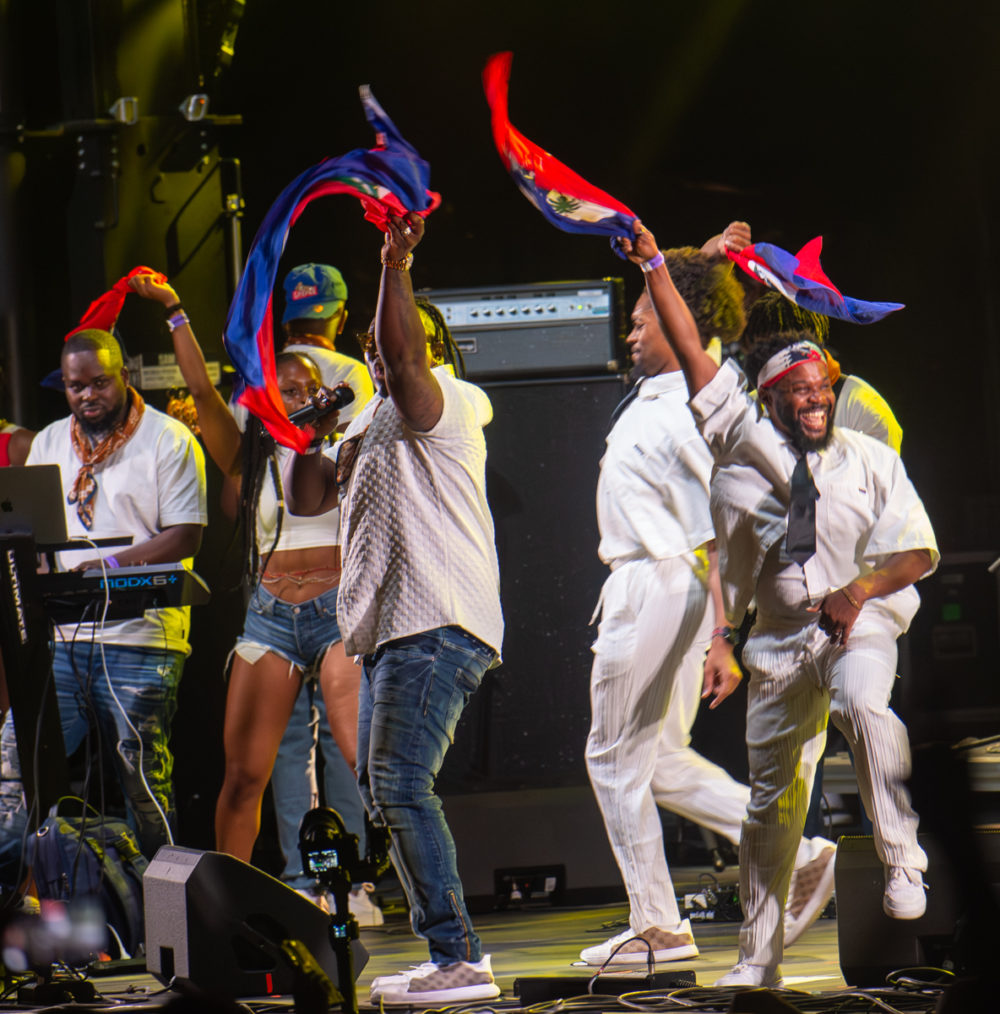
So Polo, what would you like to tell us about the show tonight?
If you're in Montreal, come out in droves because that's where it's going to be happening. The kompa is on. Kompa is sensual music, energetic music, music that draws you in, that really takes you far away.
Have you invited others to join the group tonight?
Yes, yes, yes. Usually, we don't play with horns, it's more synthesizer. But for this show we have a big lineup that will give a strong effect. So people will be able to hear what authentic konpa sounds like with a horn section up front.
I still can’t get over the idea that there are 20 Haitian bands in Montreal.
There are many, and they're all good musicians. We're really happy to have this opportunity, and thank you to the management of the Nuits d'Afrique Festival for this opportunity. We're really happy it's us who are going to represent Haiti. This city is a hub for many kinds of music. It's all about the musicians.
That’s why we come back every year. We find a lot of music here that doesn't come to us in the States.
What makes Quebec strong is its diversity. There are so many styles, so much food, so many kinds of music. It’s a varied culture, thanks to immigration. That's what makes Quebec beautiful. So the Nuits D’Afrique Festival brings us a lot of music from Africa, from Congo, Ivory Coast, Haiti... It's a really great mix, which makes it an unmissable festival. So all that keeps us here: the music, the art, the food, the culture. We feel good in Quebec when everything is mixed together; it gives life a good flavor.
Amen to that. Thanks, guys. Have a great show tonight.

Related Audio Programs
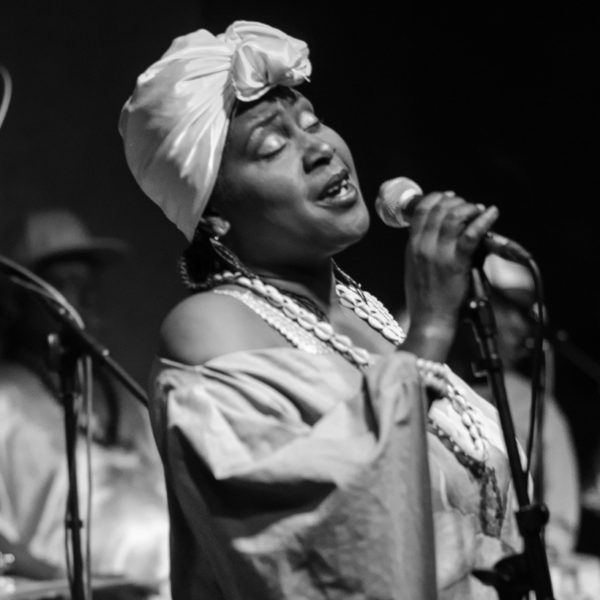
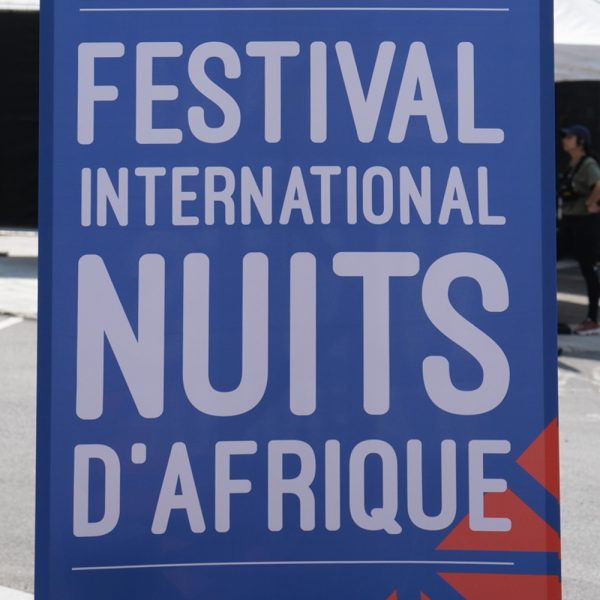
Related Articles
